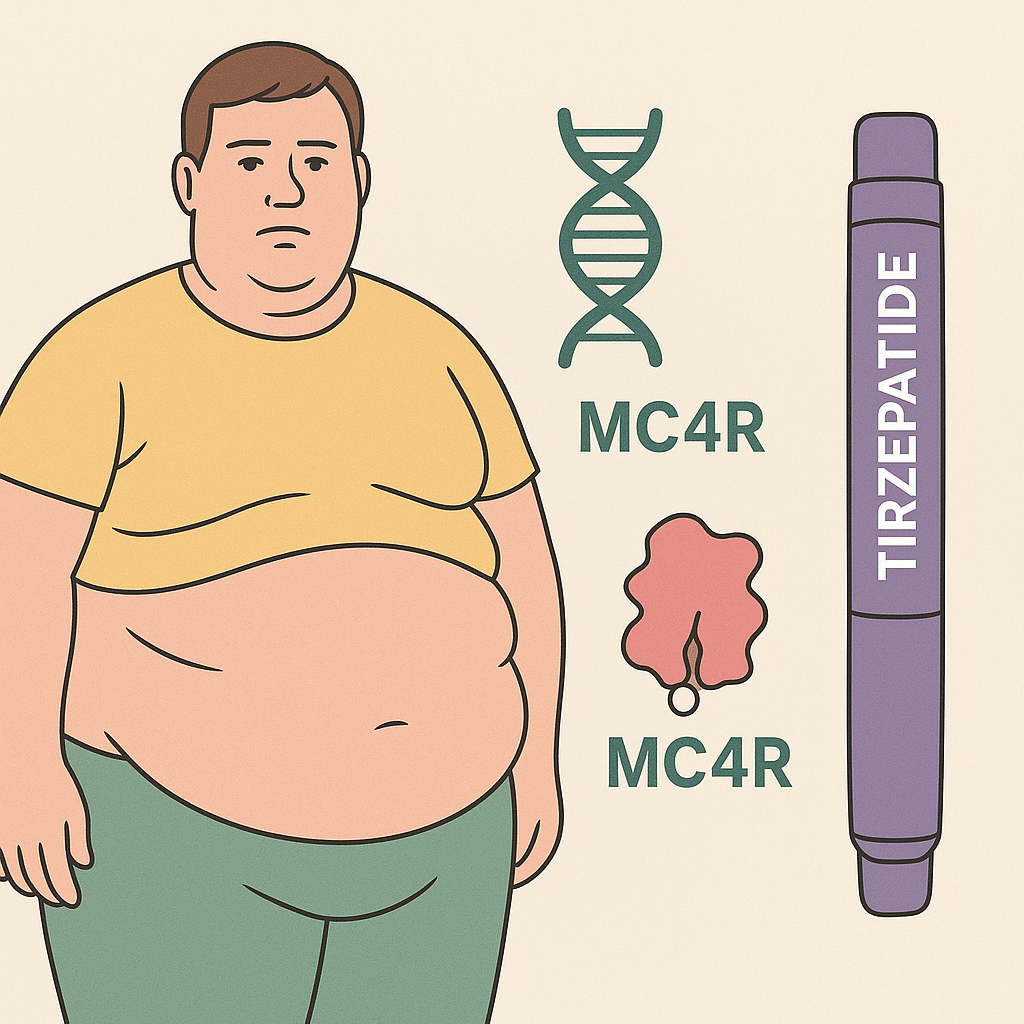Written and Reviewed By: Vikas Londhe, MPharm
A new Nature Medicine study reports that tirzepatide, the dual GLP-1 and GIP receptor agonist already known for its powerful weight-reducing effects, also works in people with melanocortin-4 receptor (MC4R) deficiency, the most common genetic form of obesity. The weight gain in patients with MC4R deficiency is hard to treat; in previous two studies it has been observed that intense dietary and physical activity intervention is also not effective in children with this deficiency; and till date no approved treatment is present for this type of obesity.
What is MC4R Deficiency?
Melanocortin-4 receptor are mainly expressed in the hypothalamus, brainstem and various other part of the brain and play an important role in regulation of satiety, hunger and food preference. Mutations in genes expressing MC4R, which predominantly inherited and cause loss of function in cells, are considered to be pathogenic. People with this condition often develop severe obesity in early life and typically respond poorly to diet, exercise, or even some obesity drugs.
MC4R Deficiency is generally characterized by hyperphagia (excessive drive to eating) weight gain that usually begins in the first 5 years of life, hyperinsulinemia; Adults with MC4R deficiency experience severe obesity.
What the study found
In the SURMOUNT-1 genetic analysis, investigators identified 32 participants (1.4%) carrying pathogenic MC4R mutations. At baseline, these individuals had features consistent with more severe obesity: they were slightly younger on average (41 vs. 45 years) and had a higher body mass index (40.0 vs. 38.0 kg/m²) compared with noncarriers. They also exhibited a larger waist circumference (120.4 cm vs. 114.0 cm), reflecting greater central adiposity. The proportion of women was similar between groups (62% in carriers vs. 68% in noncarriers). Together, these findings confirm that people with MC4R deficiency tend to develop obesity earlier, with greater severity at presentation, yet they responded to tirzepatide with weight loss comparable to that seen in noncarriers
The study followed participants for 72 weeks and showed that tirzepatide produced substantial and comparable weight loss in both groups. Individuals with MC4R mutations lost 18.3% of their baseline body weight, while noncarriers lost 19.9%, the results were reported as percentage change in weight rather than direct BMI values; this degree of weight reduction translates into a similar proportional decrease in BMI for both groups. At baseline, MC4R carriers had a higher BMI and larger waist circumference than noncarriers, but the investigators did not provide follow-up data on waist circumference changes. Overall, the findings confirm that tirzepatide leads to meaningful weight loss and BMI reduction in people with and without MC4R-related obesity
This shows that tirzepatide’s mechanism of action does not depend on MC4R signaling, but instead relies on GLP-1 and GIP pathways, which can bypass the defective melanocortin system.
Mechanism of action
Tirzepatide mimics the activity of GLP-1 and GIP, two gut hormones that act on the brain to reduce appetite, slow gastric emptying, and improve insulin sensitivity and enhances satiety by acting on centers in the hypothalamus and brainstem. Importantly, these effects appear to work independently of MC4R, allowing weight loss even in people whose MC4R signaling is impaired.
Is this a new finding?
What was already known: Before drug development, it was known that GLP-1 receptor agonists could promote weight loss through pathways outside MC4R. A small study with liraglutide in MC4R-deficient patients had hinted at possible benefits in this population also.
This is the first large genetic analysis within a major obesity trial showing that tirzepatide is equally effective in MC4R mutation carriers and noncarriers. It confirmed the evidence found in liraglutide small case reports and provides strong clinical confirmation.
Looking ahead
The findings suggest tirzepatide could finally offer an effective medical option for patients with MC4R-related obesity, a group of patients who didn’t have any treatment choice for this condition. Ongoing and planned trials (NCT06439277, NCT06075667) are expected to test tirzepatide in children and adolescents, where MC4R deficiency often begins.
In summary: This study shows tirzepatide achieves significant weight loss even in people with genetic MC4R deficiency. While the idea that GLP-1–based drugs could work in this group was suggested before, this paper provides the first large-scale confirmation, strengthening the case for tirzepatide as a treatment option in both common and rare forms of obesity.
Note: The study refers to tirzepatide, the active ingredient marketed by Eli Lilly under the brand names Mounjaro (for type 2 diabetes) and Zepbound (for obesity). Even if the publication uses the generic name, the findings can directly apply to these branded medicines.
Reference
Pallav Bhatnagar, Nadia N. Ahmad, Xuan Li et al, Tirzepatide leads to weight reduction in people with obesity due to MC4R deficiency, nature medicine, published 26 Aug 2025, https://doi.org/10.1038/s41591-025-03913-2

